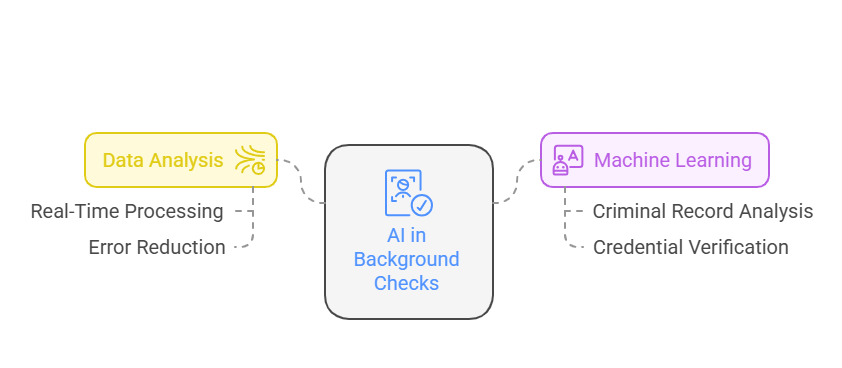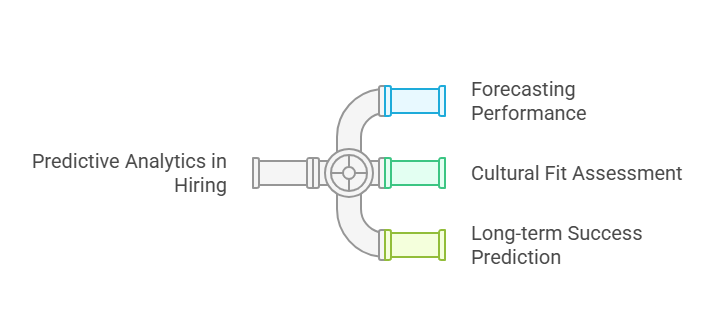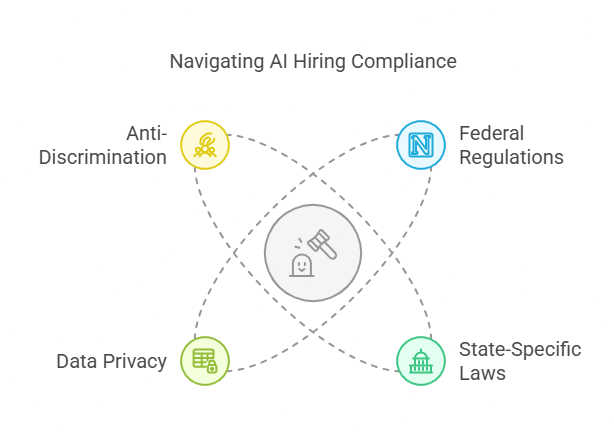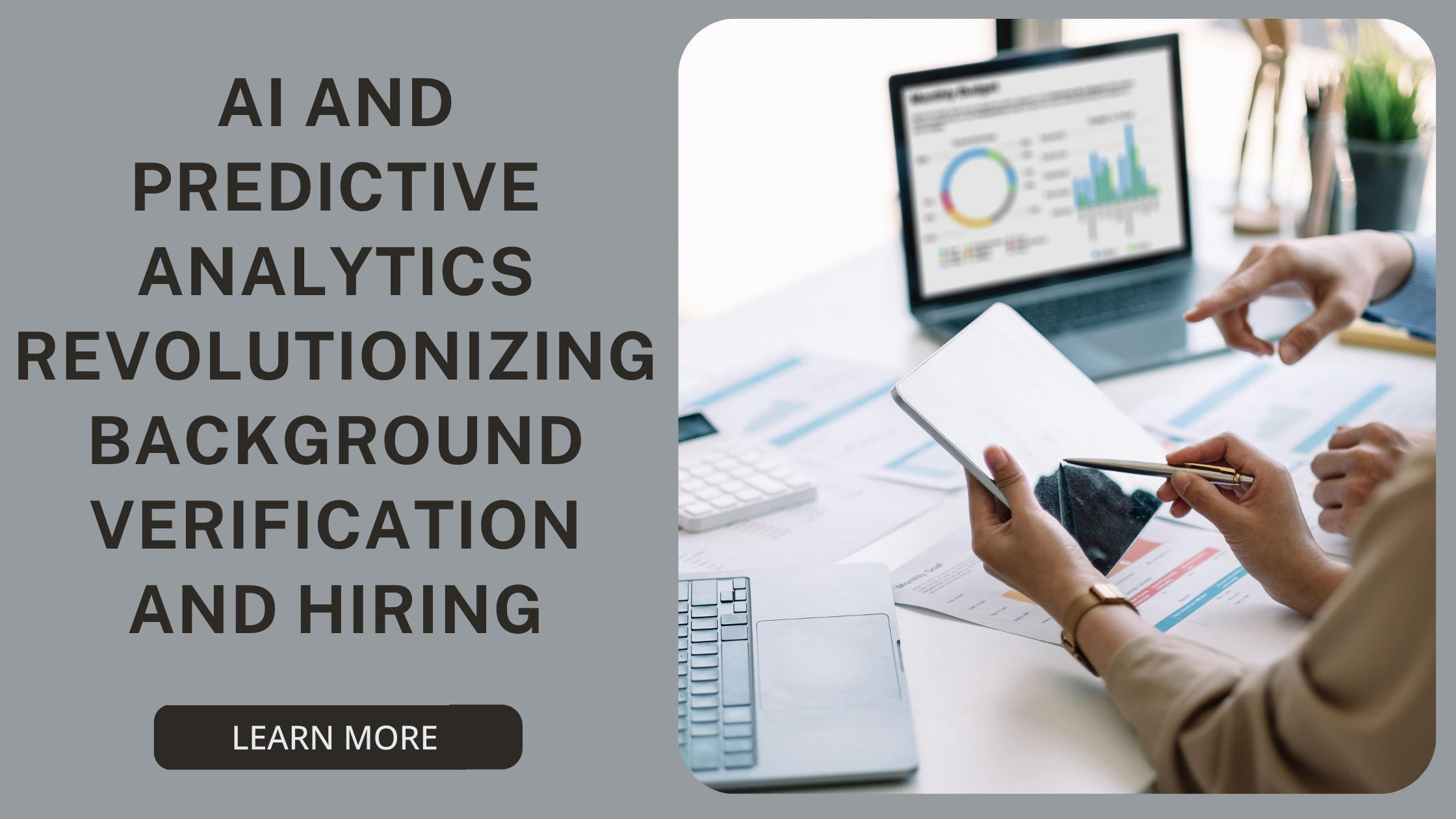AI and Predictive Analytics: Shaping the Future of Background Verification and Hiring
The landscape of hiring and background verification is undergoing a significant transformation with the introduction of AI and predictive analytics. These advancements are not only enhancing the speed and accuracy of the hiring process but also improving the decision-making capabilities of employers. As businesses face increasing competition, the ability to make smarter, more data-driven hiring choices has never been more crucial. AI and predictive analytics are the driving forces behind this evolution, offering unprecedented advantages in automation, accuracy, and efficiency.
Introduction to AI in Background Verification
Background verification has traditionally been a tedious process, relying heavily on manual labor and human judgment. However, the integration of AI and predictive analytics is revolutionizing this process. AI-driven systems can analyze vast amounts of data at lightning speeds, providing employers with deeper insights into a candidate’s background. From criminal records to employment history and education verification, AI helps ensure that the data is accurate, up-to-date, and comprehensive.
The key advantage of AI in background verification is its ability to automate the entire process. Automation eliminates human error, increases efficiency, and accelerates decision-making, all of which are critical in today’s competitive job market. AI also enhances the consistency of the background check process, as algorithms can apply the same standards and checks across all candidates, reducing the likelihood of bias or inconsistency in decision-making.
The Role of AI in Background Checks
AI excels in analyzing large datasets, making it an invaluable tool in background checks. Traditional background verification methods can be slow and prone to errors, particularly when dealing with complex or outdated data. AI’s ability to process vast amounts of information in real-time addresses this challenge, offering employers an accurate and up-to-date snapshot of a candidate’s history.
Machine learning, a subset of AI, further enhances this process by continually improving its ability to predict outcomes based on past data. For example, machine learning algorithms can analyze criminal record searches more effectively, flagging discrepancies or patterns that human reviewers may miss. These algorithms can also verify employment and educational credentials with greater accuracy, reducing the chances of fraud or misrepresentation.

One of the most important functions AI performs in background checks is risk assessment. By analyzing various data points, AI can identify potential red flags that may indicate a candidate’s likelihood to engage in risky behavior, such as criminal activity or financial irresponsibility. AI-powered systems are also capable of scoring candidates based on predictive factors, such as job performance and reliability, providing employers with valuable foresight when making hiring decisions.
How Predictive Analytics Enhances Hiring Decisions
Predictive analytics goes beyond simply verifying a candidate’s history; it helps employers anticipate future behavior and performance. By applying statistical models to historical data, predictive analytics can forecast how well a candidate is likely to perform in a role, how they will fit within the company culture, and the likelihood of their success or failure in the long term.
For instance, predictive models can assess a candidate’s past job performance, personality traits, and even social media behavior to generate a score that reflects their potential for success in a given role. This adds a layer of foresight to the hiring process, enabling employers to make more informed, data-driven decisions that extend beyond resume qualifications.

Another key benefit of predictive analytics is its ability to help companies identify hidden risks. By examining patterns in the data, predictive models can uncover candidates who may pose a risk to the organization, such as those with a history of financial difficulties or previous legal issues. This allows companies to make proactive decisions that can mitigate potential issues before they arise.
Comparison of Traditional Background Verification vs AI-Powered Background Verification
To further understand the impact of AI and predictive analytics on background verification, let’s look at a comparison between traditional background checks and AI-powered background verification.
| Factor | Traditional Background Verification | AI-Powered Background Verification |
|---|---|---|
| Time Efficiency | Slow, often takes several days or weeks | Fast, often delivers results in hours |
| Accuracy | Prone to human error and outdated data | High accuracy, real-time data processing |
| Cost | Expensive, due to manual effort and resources | More cost-effective due to automation |
| Bias Reduction | Potential for unconscious bias | Objective decision-making, reduces bias |
| Risk Assessment | Limited ability to predict future behavior | Advanced predictive capabilities |
As seen in the table, AI-powered background verification significantly outperforms traditional methods in terms of time efficiency, accuracy, cost-effectiveness, and bias reduction. Predictive analytics further enhances the process by enabling employers to assess a candidate’s potential performance and risks, adding a layer of foresight to the decision-making process.
Comparison: RapidHireSolutions vs Other Background Verification Providers
As businesses evolve, so do the tools used to ensure they’re hiring the right talent. One of the most significant advancements in this process is AI-powered background verification, which not only enhances accuracy but also streamlines the entire hiring workflow. Among the leaders in this field, RapidHireSolutions stands out for its cutting-edge technology, delivering faster, more reliable background checks compared to traditional providers.
Pros & Cons Table
| Factor | RapidHireSolutions | Competitors |
|---|---|---|
| AI-Driven Accuracy | ✅ Superior AI-powered accuracy | ❌ Limited AI integration |
| Turnaround Time | ✅ Results in 24 hours | ❌ 15–20 days or more |
| Compliance | ✅ Fully compliant with EEOC and GDPR | ❌ Potential gaps in compliance |
| Automation | ✅ Highly automated, reducing manual work | ❌ Manual intervention increases errors |
| User Experience | ✅ Easy-to-use interface with quick access | ❌ Clunky and outdated interfaces |
Overview of RapidHireSolutions Services
RapidHireSolutions is at the forefront of AI-driven background checks, providing businesses with a faster, more accurate, and cost-effective solution for their hiring needs. By leveraging AI and predictive analytics, the platform automates the tedious processes of verifying criminal records, education, and employment history. This results in not only quicker turnaround times but also reduced errors, ensuring that the information employers receive is both accurate and trustworthy.
The platform’s AI tools go beyond traditional checks, offering predictive insights into a candidate’s future performance and reliability. With RapidHireSolutions, employers gain the peace of mind that their hiring decisions are based on accurate data, combined with a thorough risk assessment that evaluates candidates on multiple levels. The result is a highly optimized hiring process that saves businesses valuable time and resources.
Turnaround Time Comparison Table
| Service | Turnaround Time |
|---|---|
| RapidHireSolutions | ✅ 24 hours |
| Competitor 1 | ❌ 15–20 days or more |
| Competitor 2 | ❌ 10–14 days |
| Competitor 3 | ❌ 7–10 days |
As shown in the table above, RapidHireSolutions provides results within 24 hours, making it the fastest option for companies that need to move quickly in their hiring processes. Traditional providers can take anywhere from several days to weeks, which can delay recruitment and result in missed opportunities.
Analysis
AI-powered background verification is revolutionizing the hiring industry by drastically reducing the time required to conduct thorough checks, enhancing the accuracy of the information, and helping employers make smarter decisions. RapidHireSolutions leads the charge in this evolution, providing cutting-edge technology that integrates seamlessly into modern hiring workflows.
The efficiency and speed of AI-driven systems are unmatched by traditional methods, making RapidHireSolutions the ideal choice for businesses seeking a competitive edge in talent acquisition. By cutting down on turnaround time and improving accuracy, RapidHireSolutions ensures that employers have the most reliable and timely information to make hiring decisions with confidence.
Legal Aspects of AI-Powered Background Verification
When integrating AI and predictive analytics into the hiring and background verification process, companies must ensure they comply with various legal frameworks. These regulations are designed to protect the privacy and rights of candidates, ensuring fairness and preventing discrimination.

Compliance with EEOC Guidelines
The Equal Employment Opportunity Commission (EEOC) enforces federal laws that prohibit discrimination in the hiring process based on race, color, religion, sex, national origin, disability, or age. AI tools used in background checks must be carefully designed to ensure they do not inadvertently introduce bias into hiring decisions. For example, an AI algorithm must be trained on diverse, unbiased data to prevent discrimination based on factors like race or gender.
To comply with the EEOC, AI-driven background verification systems should be transparent, fair, and provide consistent results across all candidates. Additionally, companies using AI in hiring must be prepared to demonstrate that their systems are fair and that decisions are based on objective criteria.
GDPR and Data Protection
For companies operating in Europe or dealing with European Union (EU) citizens, General Data Protection Regulation (GDPR) compliance is a critical consideration. GDPR governs how personal data should be collected, processed, and stored, with an emphasis on safeguarding individual privacy.
AI-powered background verification systems must ensure that they process personal data in compliance with GDPR, which includes obtaining explicit consent from candidates before collecting or analyzing their data. AI systems should also provide candidates with the right to access, correct, or delete their data if necessary. Additionally, data collected through background checks should only be stored for as long as necessary to fulfill the purpose for which it was collected.
State-Specific Laws

In addition to federal regulations like the EEOC and GDPR, various states have their own laws regarding background checks and AI hiring tools. For example, California has strict data privacy laws under the California Consumer Privacy Act (CCPA), which requires companies to provide transparency about the data they collect and how it is used. Other states may have specific regulations concerning the use of AI in hiring, such as ensuring the technology does not discriminate against protected groups or certain characteristics.
Employers must stay up-to-date with the changing legal landscape to ensure that their use of AI and predictive analytics in hiring complies with local and state-specific regulations.
FAQ Section
How does AI improve background checks?
AI enhances background checks by analyzing large datasets quickly and accurately. It reduces human error, automates the process, and uncovers potential risks that traditional methods might miss.
Is AI in background checks unbiased?
AI systems can be unbiased if they are trained on diverse, representative data. However, if not properly designed, AI tools can inadvertently introduce bias. Companies must ensure transparency and fairness when using AI in hiring.
What legal regulations affect AI in background checks?
AI in background checks must comply with EEOC guidelines, GDPR (for EU data), and state-specific laws. These regulations ensure privacy protection and prevent discrimination.
Can predictive analytics predict a candidate’s job performance?
Yes, predictive analytics uses historical data to forecast how candidates will perform in specific roles. This can help employers make more informed hiring decisions.
How long can companies store background check data?
Companies can only store background check data for as long as necessary to complete the hiring process. Under GDPR and state laws, data must be securely stored and can be deleted upon request.
Conclusion
AI and predictive analytics are revolutionizing the background verification and hiring processes, offering increased accuracy, efficiency, and predictive insights. However, the use of these technologies requires careful adherence to legal guidelines to ensure compliance and fairness. RapidHireSolutions leads the way by offering AI-powered background checks that are both fast and reliable, while ensuring compliance with all relevant regulations. As the future of hiring continues to evolve, AI and predictive analytics will play an increasingly pivotal role in shaping how businesses select the right candidates, reducing risks, and optimizing their hiring processes.

